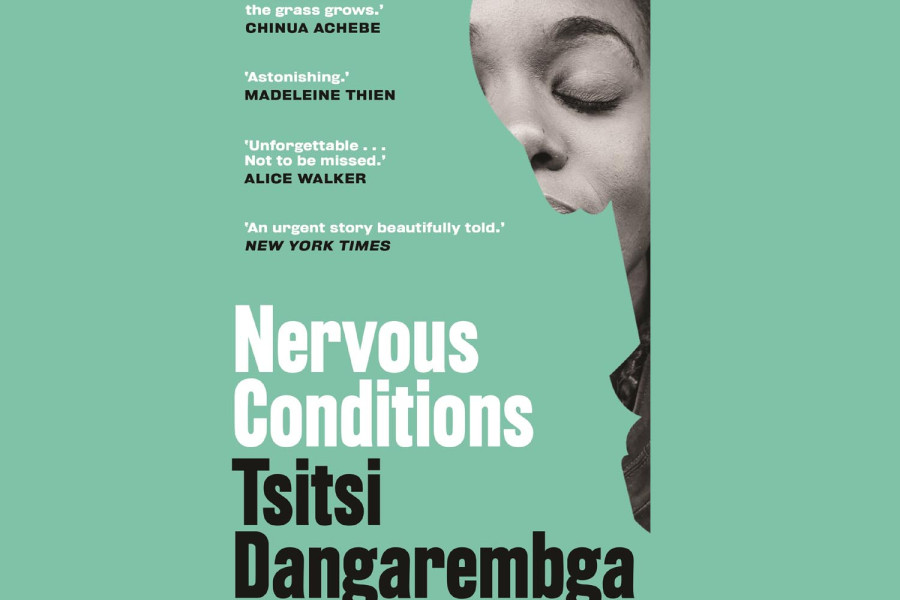Books
A price to break free
Tsitsi Dangarembga’s ‘Nervous Conditions’ explores the intersection of colonialism, patriarchy, and the quest for personal freedom.
Aarya Chand
Reading ‘Nervous Conditions’ reminded me of Maya Angelou saying, “I am not free while any woman is unfree, even when her shackles are very different from my own.” Tsitsi Dangarembga’s novel is about a similar truth. It resonates with the lives of the female characters—Tambu, Nyasha, Maiguru, Lucia, and Tambu’s mother. Their struggles reflect the universal experiences of women bounded by societal and familial expectations.
This novel is a landmark in postcolonial literature, capturing the tension between tradition and modernity, personal freedom and familial duty. Narrated by Tambu, the story begins with a striking personal anecdote: “My brother’s death was a relief.” Yet, this is not a story about death—it is about her escape. The book is a tale of survival, resilience, and the price women pay for breaking free.
The story compels readers to question whether the struggles faced by women stem more from colonial oppression or deeply entrenched patriarchal domination. Through Tambu’s mother, the novel portrays the crushing weight of being a woman in such a society. She tells her daughter, “The business of women is a heavy burden…with the poverty of blackness on one side and the weight of womanhood on the other.”
Her words encapsulate the triple marginalisation—by race, gender, and class—faced by African women. Yet, like mothers everywhere, Tambu’s mother supports her pursuit of education and dreams despite her struggles. She understands that offering Tambu this chance, even at the risk of failure, is a quiet act of rebellion against societal norms. It highlights the resilience of women, even within oppressive structures.
Determined to escape her family’s poverty, Tambu fights fiercely for her right to education. However, her journey is fraught with challenges, including her father’s belief that educating girls is futile. This reflects women’s sacrifices to carve out their space in a patriarchal world. Through her uncle Babamukuru, she learns, “These children who can go to school today are the ones whose family will prosper tomorrow,” highlighting how education becomes a means of survival—not just for Tambu but for her entire family.
Nyasha, Tambu’s cousin, is a multifaceted character. Throughout the novel, she stands out as the most sensible individual but later succumbs to the strain caused by the clash between colonial influence and traditional values. Having been raised in England, Nyasha struggles to align with her family's expectations upon returning to Zimbabwe. Her outspokenness and refusal to conform unsettle her father, Babamukuru, who embodies the novel's patriarchal ideals of discipline and control.
Although courageous, Nyasha’s rebellious actions lead to her mental breakdown, highlighting the toll of societal expectations. Her poignant observation, “They’ve trapped us… I’m not one of them, but I’m not one of you,” underscores her existential crisis. Ultimately, she becomes a victim of generational trauma and systemic oppression. Torn between two cultures, Nyasha’s struggles underscore the pervasive nature of patriarchy, which transcends culture, class, and geography, rendering women like her powerless to escape its grip.
Maiguru, Babamukuru’s wife, embodies another layer of oppression in the novel. Despite being educated, she sacrifices her career and independence to fulfil her duties as a wife and mother. Her lament, “Does anyone appreciate the sacrifices I made? As for me, no one even thinks about the things I gave up,” echoes the struggles of countless women whose contributions remain undervalued within patriarchal family structures, such as those in Nepal. The novel contrasts Maiguru’s quiet suffering with Nyasha’s open refusal to comply, yet ultimately reveals that both women remain trapped within the same oppressive system. Their experiences underscore that education alone cannot liberate women without broader societal change.
Lucia, Tambu’s outspoken aunt, defies traditional norms by refusing to marry and asserting her independence. Her boldness and refusal to conform sharply contrast with Tambu’s mother, who has internalised her oppression. This dynamic is painfully evident during Tambu’s mother’s forced participation in a humiliating re-marriage ceremony organised by Babamukuru, highlighting how women are often stripped of their dignity in the name of tradition.
As Tambu grows, she understands the extent of women's oppression. She observes, "The victimisation was universal; it didn’t depend on poverty, education, or tradition. Men took it everywhere with them." This includes men like Babamukuru, who, despite being well-educated and having seen both the inside and outside of his country, still perpetuates oppression. Tambu's realisation points to the novel’s central question: Is the problem the influence of Englishness, or is it the men who sustain oppression within the family?
The novel does not offer easy answers. While colonialism does contribute to women's issues, it is clear that patriarchy exists independently and is often prioritised by both men and women. Babamukuru, despite his role as the family’s provider and hero, values strict gender roles, illustrating how even well-meaning men promote inequality.
As Babamukuru states, "Providing money for school fees is good, but it is not all that must be done to ensure a child’s success in school. A child must also be provided with the correct atmosphere to encourage his mind to develop even when not in the classroom." However, he fails to apply this approach to his daughter, Nyasha, whose emotional and intellectual needs are neglected simply because of her gender. Furthermore, using his wife’s salary for familial purposes highlights this contradiction. These contradictions reveal how Dangarembga honestly portrays patriarchy, showing that it operates not only through direct oppression but also through subtle, everyday actions and attitudes, reinforcing gender inequality even among those who claim to act in the best interests of women.
This novel is a powerful exploration of women’s lives under the dual oppression of colonialism and patriarchy. The title ‘Nervous Condition’ captures the psychological toll of living under such systems, which is taken from Frantz Fanon’s description of the colonised mind. It forces readers to confront uncomfortable truths about power, gender, and identity, making it challenging to reflect on the structures that define our lives and how we might begin to break them down.
For Nepali readers, the novel offers a powerful reflection of our societal struggles, where women often bear the triple burden of poverty, gender, and societal expectations. Ultimately, Dangarembga’s narrative reminds us that the fight for freedom is ongoing and that liberation is not just a personal journey but a collective responsibility.
____
Nervous Conditions
Author: Tsitsi Dangarembga
Publisher: The Women's Press
Year: 1988
Pages: 204




 13.58°C Kathmandu
13.58°C Kathmandu













